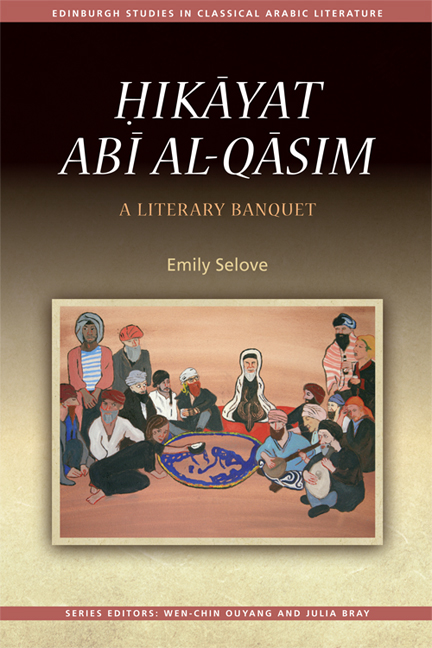Summary
This Right Whale I take to have been a Stoic; the Sperm Whale, a Platonian, who might have taken up Spinoza in his latter years.
Melville, Moby-Dick, ‘The Right Whale's Head – Contrasted View’Ḥikāyat Abī al-Qāsim, written by the otherwise unknown al-Azdī, probably in the eleventh century ad, describes a party in Isfahan that begins in the morning and lasts well into the night. Nothing impossible happens at this party: a group of fairly important, decent people have gathered together, food is served which is good but not extraordinary, and capable (though not legendary) entertainers and servants cater to the guests. The ordinariness of the event, however, is overwhelmed by the presence of a remarkable and uninvited guest, Abū al-Qāsim Aḥmad ibn 'Alī al-Tamīmī al-Baghdādī, who dominates the conversation with his wide-ranging, prolix discourse, which he spews in a quantity just barely possible for an actually human old man who had long earned his bread by entertaining with his conversation, which is who Abū al-Qāsim seems to be.
In his introduction to the Ḥikāya, al-Azdī explains that the events he represents occupy a day and a night, and can be read in that same amount of time. He also tells us that the Baghdadi guest, who dominates the conversation with his alternately obscene and elegant tirades, represents the entirety of Baghdad, and indeed a kind of microcosm of creation. The story itself is narrated in a past-continuous, iterative tense, as in ‘Abū al-Qāsim would walk into a party’, or ‘Abū al-Qāsim would say’, for example. Thus his act of party-crashing is described only as an example of the kind of thing that Abū al-Qāsim might typically do.
Tempted by al-Azdī's promise to provide a microcosm of his contemporary Baghdad, readers may look to the Ḥikāya for an example of realism, hoping to find within its pages a true-to-life microcosm of the eleventh-century city. Although the Ḥikāya brims with words for household furniture and food, we may be disappointed in our quest for a realistic depiction of the everyday, which is seemingly marred by the overabundance and obscenity of Abū al-Qāsim's speech.
- Type
- Chapter
- Information
- Hikayat Abi al-QasimA Literary Banquet, pp. 1 - 30Publisher: Edinburgh University PressPrint publication year: 2016



